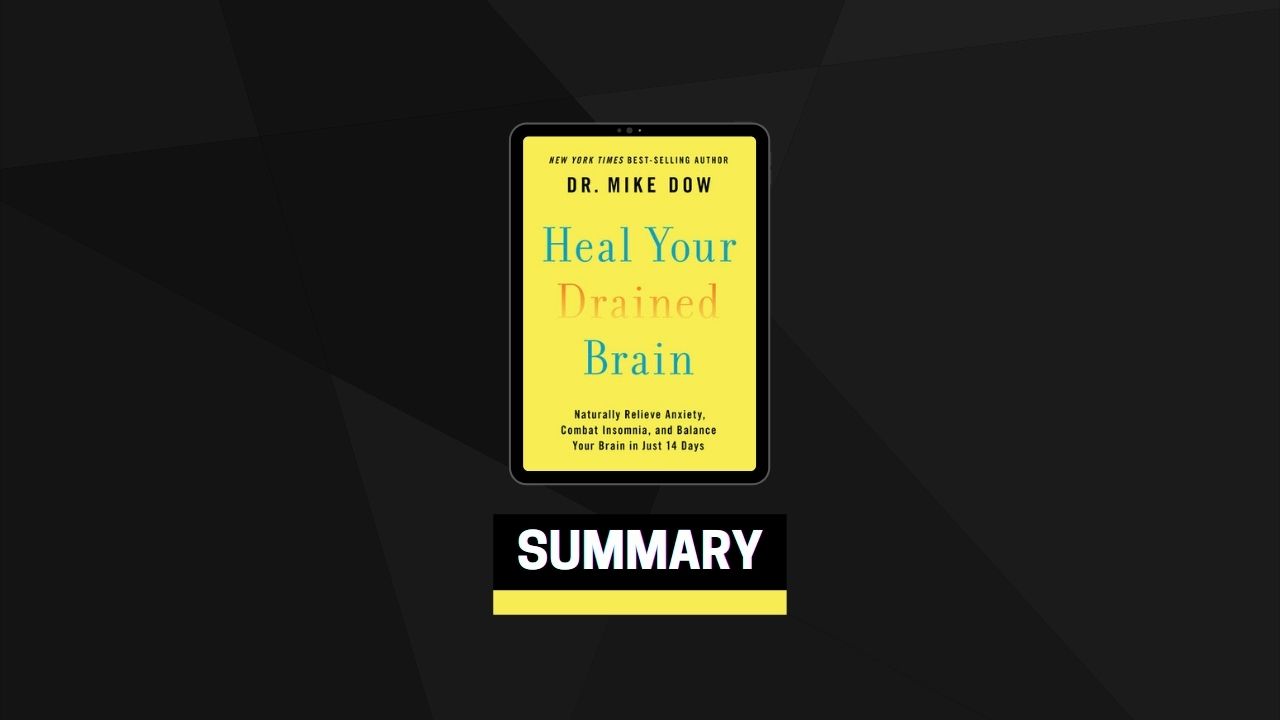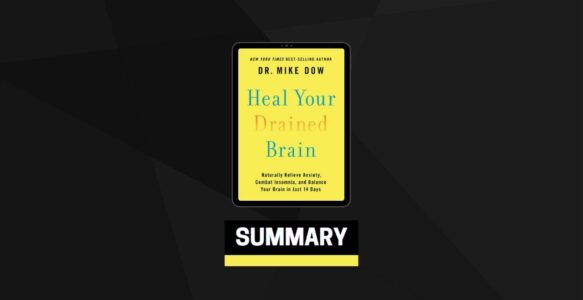An Epidemic of Drained Brains
What does it feel like to be drained?
If you have a drained brain, you feel anxious, frazzled, and fatigued. You may say you’re at the end of your rope. The proverbial gas tank of your brain that is usually filled with resilience, faith, patience, and perseverance is now running on empty.
While your brain has a pretty amazing capacity to deal with challenges, it can become overloaded. When that happens, the world becomes overwhelming, both on the large and small scale. In the bigger picture, world events seem impossible to deal with, and in your personal life, every obligation or relationship or organized outing feels overpowering. Your body holds tension, and your brain generates worry. Sleep, concentration, and motivation become problematic. Psychological worry leads to physical consequences. Chronic conditions—everything from heart disease to cancer to digestive issues—are exacerbated, and new diseases are more likely to develop. This problematic response makes everyday tasks difficult, and you “just wish [you] had a break”—though it takes a bit more than a simple break to recover.
Wired for Brain Drain
Worry-induced drain is that this condition may have developed over time as a means of survival. For example, the researchers who found the correlation between higher IQs and generalized anxiety disorder suggest this may be a function of evolution. Whereas a nonanxious and intelligent person will detect some danger, the anxious and intelligent person will always be considering the possibility of danger. This would mean the anxiety and worry helped the person stay alive as he or she was perennially on the lookout for anything that could harm him or her.
People wired in this way are not only more likely to see the danger but also apt to take quick physical action in response. People wired for worry and brain drain process threats in a different area of the brain: the motor-specific parts that help you to quickly move out of the way of danger. People who do not suffer from anxiety, on the other hand, process these threats in the temporal region of the brain, which leads to a more passive and less physical response to threats.
Balance Your Blood Sugar
Using food as self-medication is, after all, the most socially acceptable way to drug yourself. We all know that pints of ice cream put Band-Aids on worries and broken hearts. But sugar can be a disaster for your brain. It’s vital for all of us to reduce the blood-sugar spikes lurking in all the tempting food most Americans are presented with 24/7.
Remember: these processed foods are extremely profitable to food companies and restaurants. The profit margin on soda and processed foods is sky high; the margin on healthy proteins and organic vegetables is pretty low. This means the processed foods and soda are marketed to you more heavily to keep the shareholders happy. While they tempt you to improve their bottom line, your waistline ends up paying the price. And as your waistline grows with blood sugar–spiking foods, your hippocampus shrinks. Remember, this is the part of the brain that helps you remain resilient in the faces of stress and helps mood regulation by controlling your sympathetic and parasympathetic nervous systems. It’s also the part of the brain where the most neurogenesis, the growth of new brain cells, occurs.
There are some simple additions you can make to your diet that can minimize draining blood sugar spikes.
- Eat raw or slightly cooked vegetables. The more you cook a vegetable, the more you may compromise the blood sugar–blocking capabilities of the fiber it contains. This fiber can minimize some of the blood sugar spikes created by carbs, especially when you eat the vegetable before the carb.
- Use vinegar. Vinegar has been shown to keep blood-sugar levels in check by preventing some of the starch in bread or pasta from turning into sugar. You’ll effortlessly lower your blood sugar by switching from store-bought salad dressings that often contain sugar to a simple blend of vinegar and olive oil.
- Drink Tea. Tea may reduce the amount of glucose absorbed by the intestine, which reduces blood sugar spikes. So drink a glass of unsweetened, black iced tea at lunch. One study showed black tea did this better than other types of tea. White tea was second best at preventing blood sugar spikes and also contains very little caffeine, which makes it a great choice to accompany dinner at night.
- Enjoy some red wine. For those without a history of alcoholism or problem drinking, a glass of red wine with dinner may lessen blood sugar spikes by preventing intestinal glucose absorption and reducing your liver’s production of glucose. One study found that red wine may be more effective at blocking glucose absorption than white wine.7 One glass of wine can balance the brain, but more can drain it since excess alcohol increases cortisol levels.
Eat Peaceful Proteins and Feel-Good Fats
So what’s healthy about eating fats and proteins? In short, they contain important elements to build your body and brain. Omega-3s and omega-6s are essential fatty acids (EFAs). They are indeed essential because your body can’t make them, which is why you must get them through foods. EFAs serve functions in the body like helping to transport cholesterol in the blood and aiding in bone repair. They are also crucial to your brain: getting enough of the EFA alpha-linolenic acid (ALA) can prevent inflammation in your brain.
The issue that’s come to exist with the standard Western diet is that we are getting too many omega-6s and too few omega-3s, and when this balance is off, it will leave you feeling drained. And it’s not just that we need to up our omega-3 intake; we need to lower our omega-6 intake. Omega-3s compete for space with omega-6s in your cells, so even if you take a high-dose omega-3 supplement every day or eat salmon at one meal, some of the benefit is actually negated by the high omega-6 levels if you eat factory-farmed meat and processed foods at the other two meals. With too many omega-6s, we experience inflammation, which leads to health problems down the road. Omega-3s are anti-inflammatory and associated with health benefits including less anxiety and insomnia, so we have to free up space within our bodies to allow omega-3s to work their magic.
Aside from omega-3s and omega-6s, fats and proteins contain cholesterol, which isn’t inherently bad. In fact, in some studies, it’s been shown that low levels of cholesterol have been linked with depressive symptoms.
The issue is that we have to eat the right kinds of fat and protein. There are two types of cholesterol: LDL cholesterol is the “bad” version, and HDL is the “good” one. The standard Western diet often contains too much LDL and not nearly enough HDL.
Embrace the Power of Probiotics
Healthy bacteria are potent weapons against stress and insomnia because they have the ability to manufacture all your major brain-balancing neurotransmitters. These are the same neurotransmitters that antianxiety drugs like Xanax and antidepressants like Prozac aim to boost, but you can get them naturally through food. In fact, the natural form of GABA, sold as the dietary supplement PharmaGABA, is made from the bacteria Lactobacillus hilgardii which is used to ferment the probiotic-rich Korean cabbage dish kimchi. It releases GABA, albeit in a natural form, just like benzodiazepines like Xanax do.
Let’s take a quick look at the way three of your most important brain balancers are made in the gut with good bacteria:
- Bifidobacterium, GABA
- Enterococcus, serotonin
- Escherichia, serotonin
- Lactobacillus, acetylcholine, GABA
- Streptococcus, serotonin
So as you can see, a balanced gut is key to keeping your body—and your brain—in tiptop shape. The good news: We have the power to heal our disrupted gut every day by what we ingest. We just have to ditch processed foods while increasing our intake of probiotic-rich ones. Eat a wide variety of plant-based foods like vegetables, natural grains, and nuts. Also, only use antibiotics when you need them, choose stevia over artificial sweeteners, reserve alcohol-based sanitizers for occasional use when soap and water aren’t available, and avoid toothpaste with the antibacterial agent triclosan.
Jog for Joy
While any form of exercise you choose to do is beneficial in healing a drained brain, there are also some differences among particular types of exercise in the way they can reduce stress and insomnia. And while the best exercise is the one you’ll actually do regularly, new research may make a case for varying your routine from time to time to reap the greatest benefits. You won’t just be cross-training your body; you’ll be cross-training your brain. Runners should do a little yoga. Sprinters should do some distance jogs. Yogis should do a few boot camps. And weight lifters should do some tai chi, because each one can relieve stress in unique ways by targeting different areas of the brain that contribute to feeling drained.
Instead of cracking open another bottle of beer or popping another Xanax, try a jog around the neighborhood, do 44 minutes on the elliptical trainer, take a long bike ride, or sign up for a Zumba class to help undo the damage that stress, unhealthy food, or trauma has had on the brain. As a preventive measure, this larger hippocampus will also make you more resilient and less likely to become drained in the future.
Even better news: You won’t have to wait months or years to start to feel an improvement. In fact, a simple walk or jog helps you to see the world in a more positive light in just 10 minutes. In one experiment, subjects were shown the dotted outline of a human. People with anxiety are more likely to perceive a neutral image as facing them since it’s an indicator of threat. But after just 10 minutes of walking or jogging on a treadmill, subjects were more likely to judge the figure as facing away from them.
This form of exercise is also quite soothing for many people and great for days you’re feeling depleted. Sustained aerobic exercise isn’t as likely to initially spike adrenaline, norepinephrine, and cortisol levels like interval training or weight lifting can, so it’s a great type of exercise to choose when you’re seeking immediate stress relief. A quiet afternoon jog or bike ride in nature can help you to shut off the worrying mind. So put on those running shoes or take that bike out of the garage this weekend. It will almost instantly shift your outlook and the way you see the world, and in the long term, your brain grows as your waistline shrinks.


